北师大版高中英语模块4 Unit 10 Money 不定式复习
文档属性
| 名称 | 北师大版高中英语模块4 Unit 10 Money 不定式复习 |
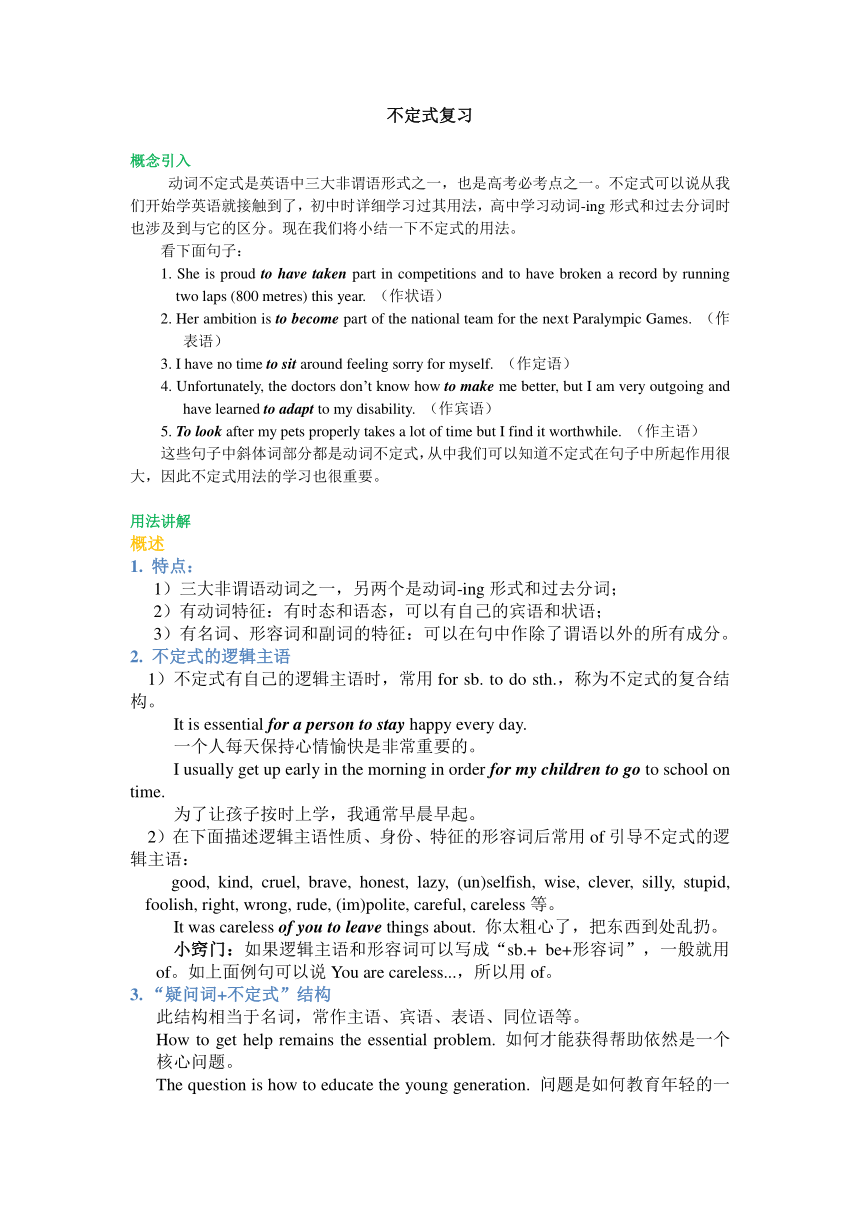
|
|
| 格式 | zip | ||
| 文件大小 | 39.1KB | ||
| 资源类型 | 教案 | ||
| 版本资源 | 北师大版 | ||
| 科目 | 英语 | ||
| 更新时间 | 2019-11-10 00:00:00 | ||
图片预览

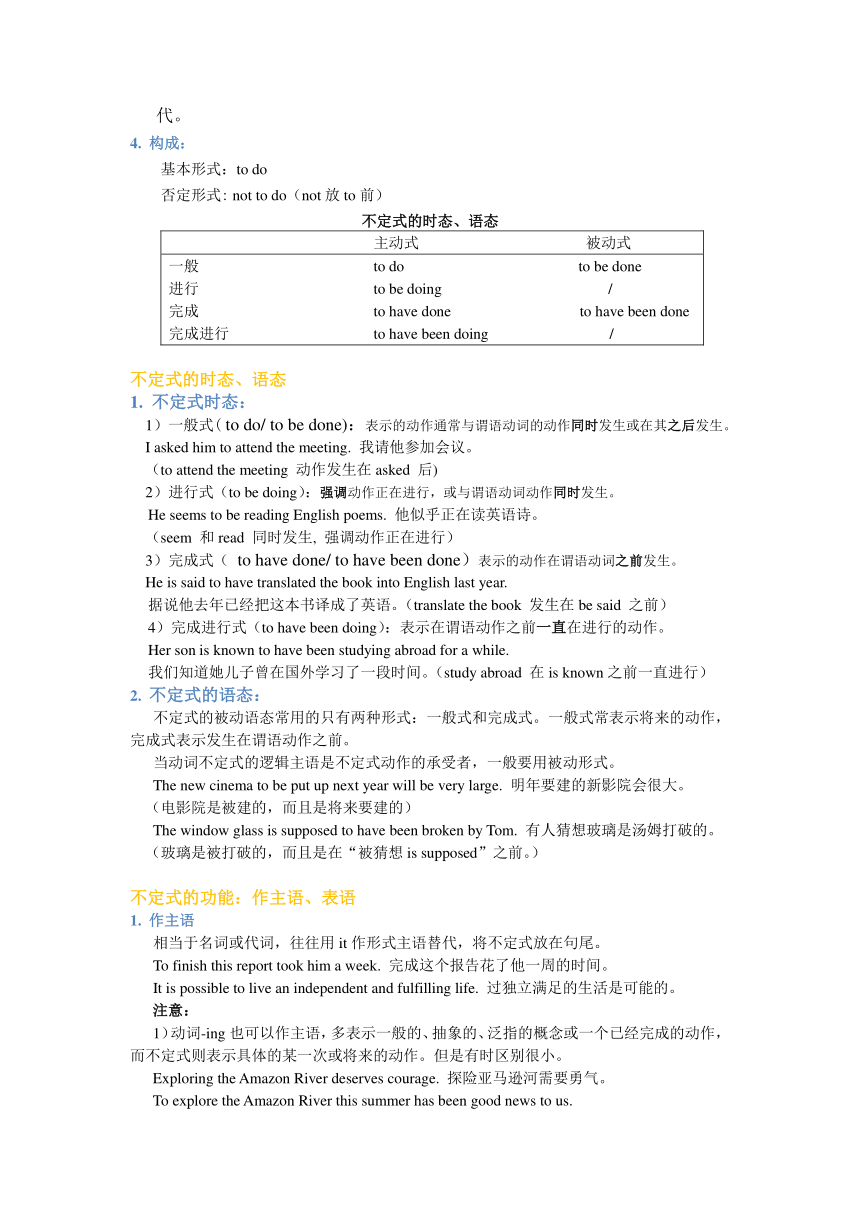
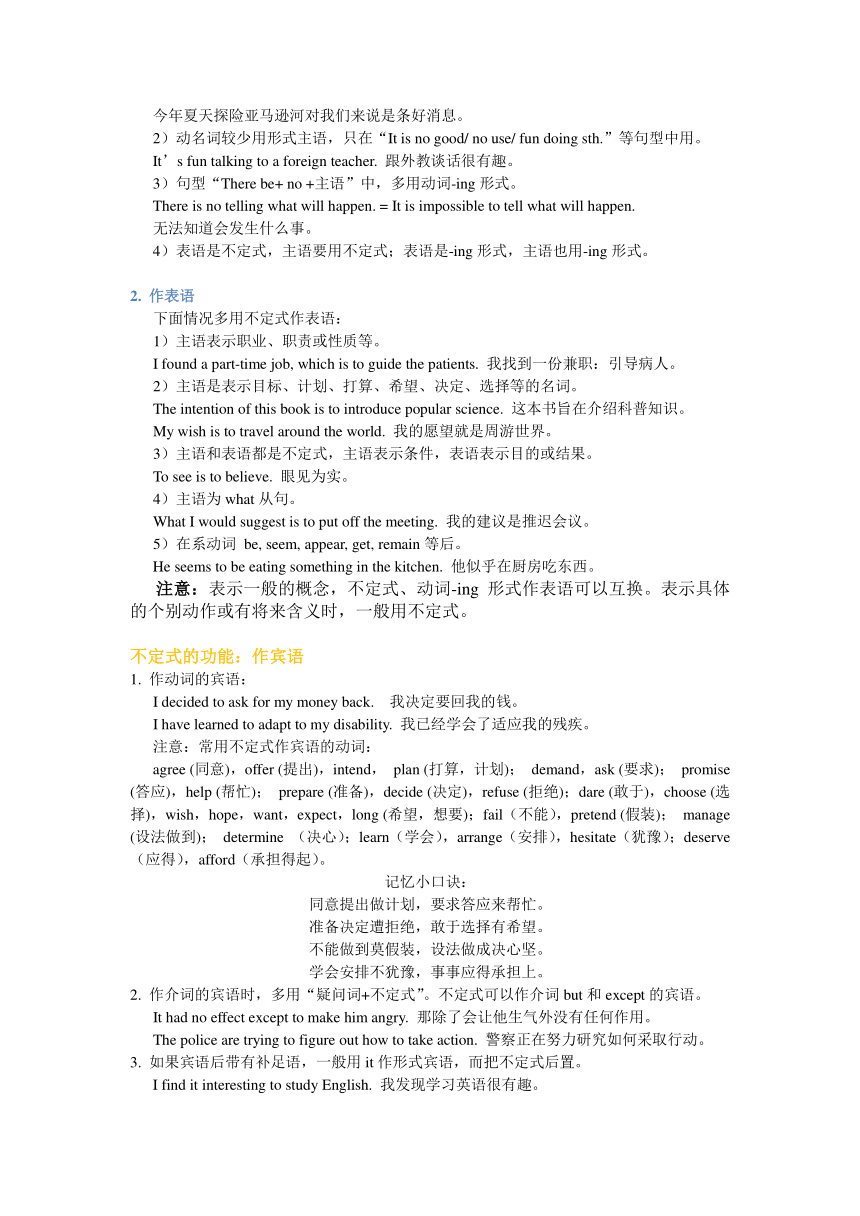
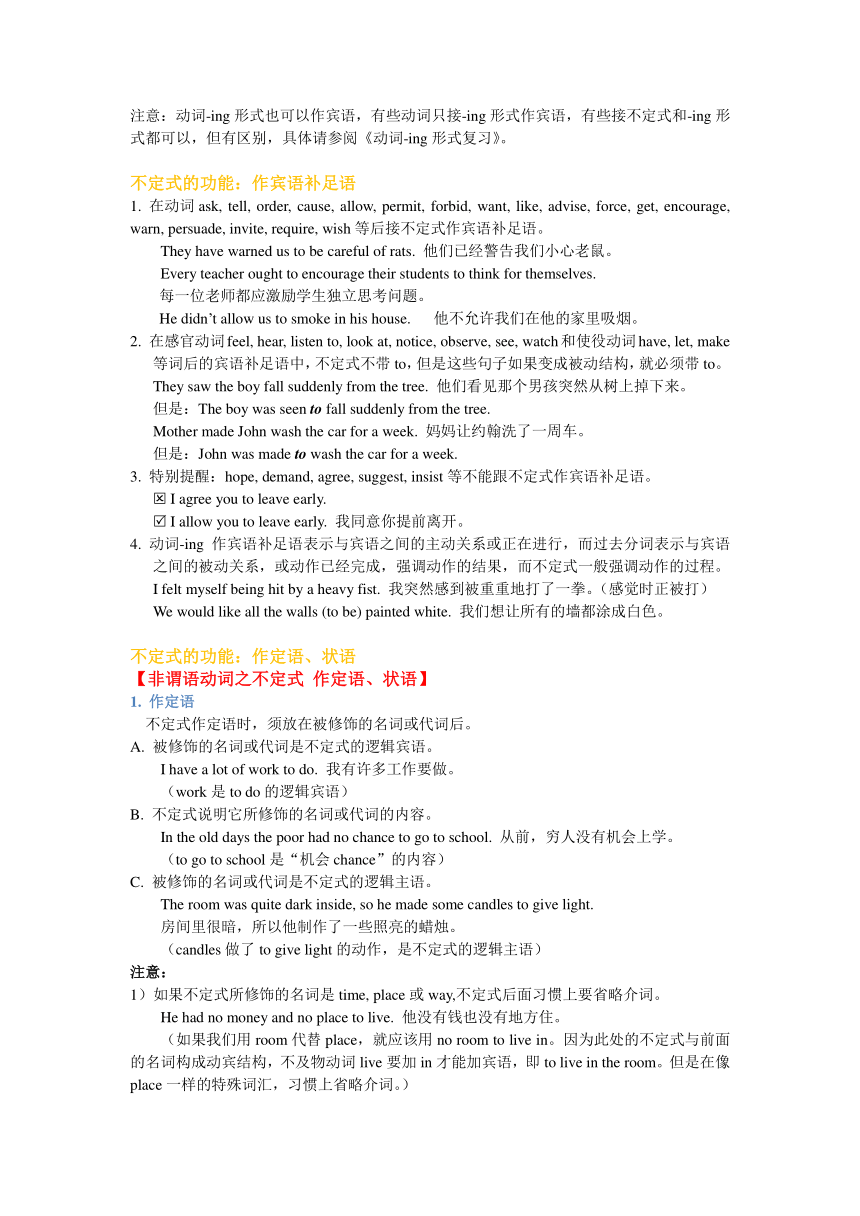
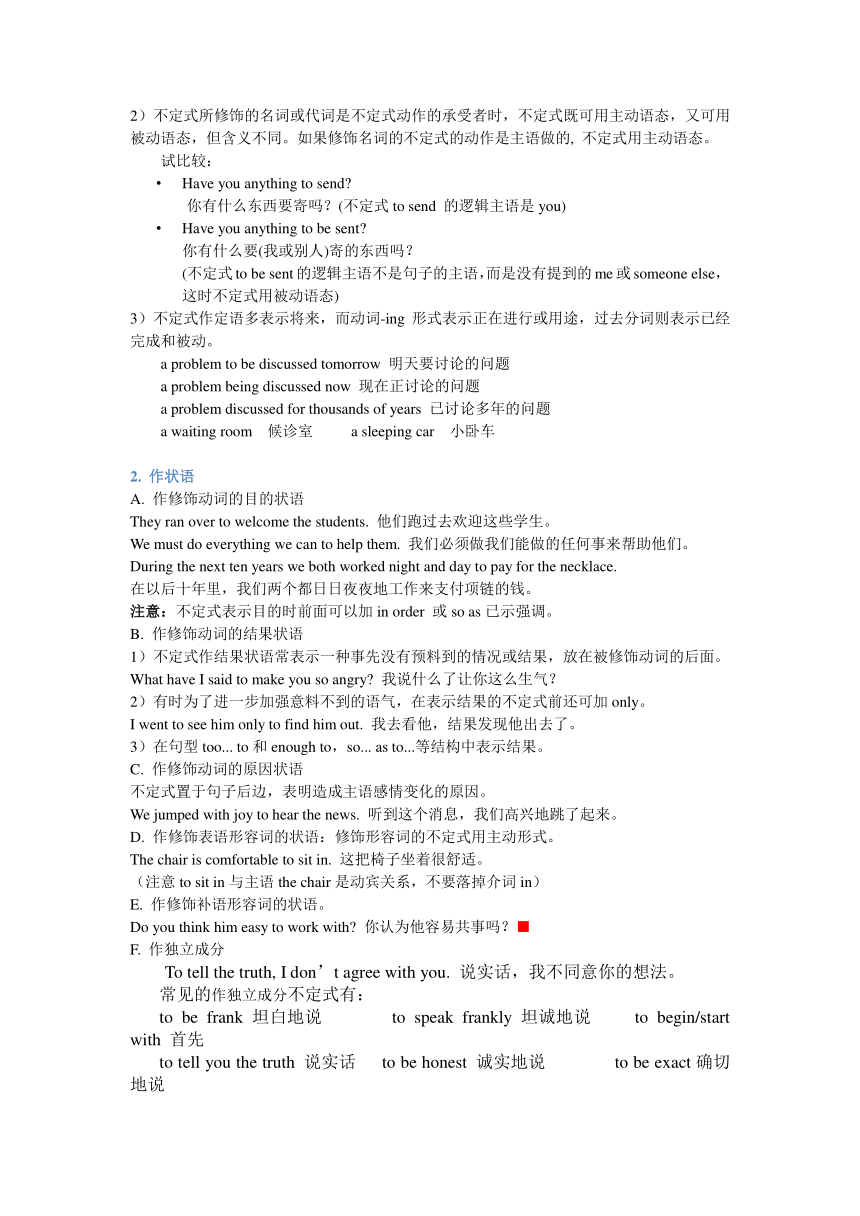
文档简介
不定式复习
概念引入
动词不定式是英语中三大非谓语形式之一,也是高考必考点之一。不定式可以说从我们开始学英语就接触到了,初中时详细学习过其用法,高中学习动词-ing形式和过去分词时也涉及到与它的区分。现在我们将小结一下不定式的用法。
看下面句子:
1. She is proud to have taken part in competitions and to have broken a record by running two laps (800 metres) this year. (作状语)
2. Her ambition is to become part of the national team for the next Paralympic Games. (作表语)
3. I have no time to sit around feeling sorry for myself. (作定语)
4. Unfortunately, the doctors don’t know how to make me better, but I am very outgoing and have learned to adapt to my disability. (作宾语)
5. To look after my pets properly takes a lot of time but I find it worthwhile. (作主语)
这些句子中斜体词部分都是动词不定式,从中我们可以知道不定式在句子中所起作用很大,因此不定式用法的学习也很重要。
用法讲解
概述
1. 特点:
1)三大非谓语动词之一,另两个是动词-ing形式和过去分词;
2)有动词特征:有时态和语态,可以有自己的宾语和状语;
3)有名词、形容词和副词的特征:可以在句中作除了谓语以外的所有成分。
2. 不定式的逻辑主语
1)不定式有自己的逻辑主语时,常用for sb. to do sth.,称为不定式的复合结构。
It is essential for a person to stay happy every day.
一个人每天保持心情愉快是非常重要的。
I usually get up early in the morning in order for my children to go to school on time.
为了让孩子按时上学,我通常早晨早起。
2)在下面描述逻辑主语性质、身份、特征的形容词后常用of引导不定式的逻辑主语:
good, kind, cruel, brave, honest, lazy, (un)selfish, wise, clever, silly, stupid, foolish, right, wrong, rude, (im)polite, careful, careless等。
It was careless of you to leave things about. 你太粗心了,把东西到处乱扔。
小窍门:如果逻辑主语和形容词可以写成“sb.+ be+形容词”,一般就用of。如上面例句可以说You are careless...,所以用of。
3. “疑问词+不定式”结构
此结构相当于名词,常作主语、宾语、表语、同位语等。
How to get help remains the essential problem. 如何才能获得帮助依然是一个核心问题。
The question is how to educate the young generation. 问题是如何教育年轻的一代。
4. 构成:
基本形式:to do
否定形式: not to do(not放to前)
不定式的时态、语态
主动式 被动式
一般 to do to be done
进行 to be doing /
完成 to have done to have been done
完成进行 to have been doing /
不定式的时态、语态
1. 不定式时态:
1)一般式( to do/ to be done):表示的动作通常与谓语动词的动作同时发生或在其之后发生。
I asked him to attend the meeting. 我请他参加会议。
(to attend the meeting 动作发生在asked 后)
2)进行式(to be doing):强调动作正在进行,或与谓语动词动作同时发生。
He seems to be reading English poems. 他似乎正在读英语诗。
(seem 和read 同时发生, 强调动作正在进行)
3)完成式( to have done/ to have been done)表示的动作在谓语动词之前发生。
He is said to have translated the book into English last year.
据说他去年已经把这本书译成了英语。(translate the book 发生在be said 之前)
4)完成进行式(to have been doing):表示在谓语动作之前一直在进行的动作。
Her son is known to have been studying abroad for a while.
我们知道她儿子曾在国外学习了一段时间。(study abroad 在is known之前一直进行)
2. 不定式的语态:
不定式的被动语态常用的只有两种形式:一般式和完成式。一般式常表示将来的动作,完成式表示发生在谓语动作之前。
当动词不定式的逻辑主语是不定式动作的承受者,一般要用被动形式。
The new cinema to be put up next year will be very large. 明年要建的新影院会很大。
(电影院是被建的,而且是将来要建的)
The window glass is supposed to have been broken by Tom. 有人猜想玻璃是汤姆打破的。
(玻璃是被打破的,而且是在“被猜想is supposed”之前。)
不定式的功能:作主语、表语
1. 作主语
相当于名词或代词,往往用it作形式主语替代,将不定式放在句尾。
To finish this report took him a week. 完成这个报告花了他一周的时间。
It is possible to live an independent and fulfilling life. 过独立满足的生活是可能的。
注意:
1)动词-ing也可以作主语,多表示一般的、抽象的、泛指的概念或一个已经完成的动作,而不定式则表示具体的某一次或将来的动作。但是有时区别很小。
Exploring the Amazon River deserves courage. 探险亚马逊河需要勇气。
To explore the Amazon River this summer has been good news to us.
今年夏天探险亚马逊河对我们来说是条好消息。
2)动名词较少用形式主语,只在“It is no good/ no use/ fun doing sth.”等句型中用。
It’s fun talking to a foreign teacher. 跟外教谈话很有趣。
3)句型“There be+ no +主语”中,多用动词-ing形式。
There is no telling what will happen. = It is impossible to tell what will happen.
无法知道会发生什么事。
4)表语是不定式,主语要用不定式;表语是-ing形式,主语也用-ing形式。
2. 作表语
下面情况多用不定式作表语:
1)主语表示职业、职责或性质等。
I found a part-time job, which is to guide the patients. 我找到一份兼职:引导病人。
2)主语是表示目标、计划、打算、希望、决定、选择等的名词。
The intention of this book is to introduce popular science. 这本书旨在介绍科普知识。
My wish is to travel around the world. 我的愿望就是周游世界。
3)主语和表语都是不定式,主语表示条件,表语表示目的或结果。
To see is to believe. 眼见为实。
4)主语为what从句。
What I would suggest is to put off the meeting. 我的建议是推迟会议。
5)在系动词 be, seem, appear, get, remain等后。
He seems to be eating something in the kitchen. 他似乎在厨房吃东西。
注意:表示一般的概念,不定式、动词-ing形式作表语可以互换。表示具体的个别动作或有将来含义时,一般用不定式。
不定式的功能:作宾语
1. 作动词的宾语:
I decided to ask for my money back. 我决定要回我的钱。
I have learned to adapt to my disability. 我已经学会了适应我的残疾。
注意:常用不定式作宾语的动词:
agree (同意),offer (提出),intend, plan (打算,计划); demand,ask (要求); promise (答应),help (帮忙); prepare (准备),decide (决定),refuse (拒绝);dare (敢于),choose (选择),wish,hope,want,expect,long (希望,想要);fail(不能),pretend (假装); manage (设法做到); determine (决心);learn(学会),arrange(安排),hesitate(犹豫);deserve(应得),afford(承担得起)。
记忆小口诀:
同意提出做计划,要求答应来帮忙。
准备决定遭拒绝,敢于选择有希望。
不能做到莫假装,设法做成决心坚。
学会安排不犹豫,事事应得承担上。
2. 作介词的宾语时,多用“疑问词+不定式”。不定式可以作介词but和except的宾语。
It had no effect except to make him angry. 那除了会让他生气外没有任何作用。
The police are trying to figure out how to take action. 警察正在努力研究如何采取行动。
3. 如果宾语后带有补足语,一般用it作形式宾语,而把不定式后置。
I find it interesting to study English. 我发现学习英语很有趣。
注意:动词-ing形式也可以作宾语,有些动词只接-ing形式作宾语,有些接不定式和-ing形式都可以,但有区别,具体请参阅《动词-ing形式复习》。
不定式的功能:作宾语补足语
1. 在动词ask, tell, order, cause, allow, permit, forbid, want, like, advise, force, get, encourage, warn, persuade, invite, require, wish等后接不定式作宾语补足语。
They have warned us to be careful of rats. 他们已经警告我们小心老鼠。
Every teacher ought to encourage their students to think for themselves.
每一位老师都应激励学生独立思考问题。
He didn’t allow us to smoke in his house. 他不允许我们在他的家里吸烟。
2. 在感官动词feel, hear, listen to, look at, notice, observe, see, watch和使役动词have, let, make等词后的宾语补足语中,不定式不带to,但是这些句子如果变成被动结构,就必须带to。
They saw the boy fall suddenly from the tree. 他们看见那个男孩突然从树上掉下来。
但是:The boy was seen to fall suddenly from the tree.
Mother made John wash the car for a week. 妈妈让约翰洗了一周车。
但是:John was made to wash the car for a week.
3. 特别提醒:hope, demand, agree, suggest, insist等不能跟不定式作宾语补足语。
( I agree you to leave early.
( I allow you to leave early. 我同意你提前离开。
4. 动词-ing作宾语补足语表示与宾语之间的主动关系或正在进行,而过去分词表示与宾语之间的被动关系,或动作已经完成,强调动作的结果,而不定式一般强调动作的过程。
I felt myself being hit by a heavy fist. 我突然感到被重重地打了一拳。(感觉时正被打)
We would like all the walls (to be) painted white. 我们想让所有的墙都涂成白色。
不定式的功能:作定语、状语
【非谓语动词之不定式 作定语、状语】
1. 作定语
不定式作定语时,须放在被修饰的名词或代词后。
A. 被修饰的名词或代词是不定式的逻辑宾语。
I have a lot of work to do. 我有许多工作要做。
(work是to do的逻辑宾语)
B. 不定式说明它所修饰的名词或代词的内容。
In the old days the poor had no chance to go to school. 从前,穷人没有机会上学。
(to go to school是“机会chance”的内容)
C. 被修饰的名词或代词是不定式的逻辑主语。
The room was quite dark inside, so he made some candles to give light.
房间里很暗,所以他制作了一些照亮的蜡烛。
(candles做了to give light的动作,是不定式的逻辑主语)
注意:
1)如果不定式所修饰的名词是time, place或way,不定式后面习惯上要省略介词。
He had no money and no place to live. 他没有钱也没有地方住。
(如果我们用room代替place,就应该用no room to live in。因为此处的不定式与前面的名词构成动宾结构,不及物动词live要加in才能加宾语,即to live in the room。但是在像place一样的特殊词汇,习惯上省略介词。)
2)不定式所修饰的名词或代词是不定式动作的承受者时,不定式既可用主动语态,又可用被动语态,但含义不同。如果修饰名词的不定式的动作是主语做的, 不定式用主动语态。
试比较:
Have you anything to send?
你有什么东西要寄吗?(不定式to send 的逻辑主语是you)
Have you anything to be sent?
你有什么要(我或别人)寄的东西吗?
(不定式to be sent的逻辑主语不是句子的主语,而是没有提到的me或someone else,这时不定式用被动语态)
3)不定式作定语多表示将来,而动词-ing形式表示正在进行或用途,过去分词则表示已经完成和被动。
a problem to be discussed tomorrow 明天要讨论的问题
a problem being discussed now 现在正讨论的问题
a problem discussed for thousands of years 已讨论多年的问题
a waiting room 候诊室 a sleeping car 小卧车
2. 作状语
A. 作修饰动词的目的状语
They ran over to welcome the students. 他们跑过去欢迎这些学生。
We must do everything we can to help them. 我们必须做我们能做的任何事来帮助他们。
During the next ten years we both worked night and day to pay for the necklace.
在以后十年里,我们两个都日日夜夜地工作来支付项链的钱。
注意:不定式表示目的时前面可以加in order 或so as已示强调。
B. 作修饰动词的结果状语
1)不定式作结果状语常表示一种事先没有预料到的情况或结果,放在被修饰动词的后面。
What have I said to make you so angry? 我说什么了让你这么生气?
2)有时为了进一步加强意料不到的语气,在表示结果的不定式前还可加only。
I went to see him only to find him out. 我去看他,结果发现他出去了。
3)在句型too... to和enough to,so... as to...等结构中表示结果。
C. 作修饰动词的原因状语
不定式置于句子后边,表明造成主语感情变化的原因。
We jumped with joy to hear the news. 听到这个消息,我们高兴地跳了起来。
D. 作修饰表语形容词的状语:修饰形容词的不定式用主动形式。
The chair is comfortable to sit in. 这把椅子坐着很舒适。
(注意to sit in与主语the chair是动宾关系,不要落掉介词in)
E. 作修饰补语形容词的状语。
Do you think him easy to work with? 你认为他容易共事吗?■
F. 作独立成分
To tell the truth, I don’t agree with you. 说实话,我不同意你的想法。
常见的作独立成分不定式有:
to be frank坦白地说 to speak frankly 坦诚地说 to begin/start with 首先
to tell you the truth 说实话 to be honest 诚实地说 to be exact确切地说
to sum up 总之 to cap it all 总之 to put it briefly 简言之
G. 不定式作状语一般仅限于上述情况,而其它状语多用动词-ing形式或过去分词充当。
Read many times (=Having been read many times), the crabbed story seems much easier.
读过好多遍了,这个深奥的故事似乎变得浅显了。
(原因状语,而不定式作原因状语只接在表示情感的形容词或动词后)
不带to的不定式
1. 在使役动词make, let, have和感官动词feel, hear, listen to, see, look at, watch, notice, observe等后不定式作宾语补足语时省略to。
2. help后的不定式作宾语补足语时,to有时可以省略,但当主语是表示物的名词或主语不能发出不定式动作时需要带to。
Green tea can help you to feel relaxed and refreshed.
绿茶可以使你感到轻松、精力充沛。
3. 在以why开头的疑问句中不定式不带to。
Why worry about it? 担心这个干什么?
Why not do it right now? 为什么不现在就做呢?
4. 不定式在介词but, except, besides后,如果其前有实义动词do,不定式不带to。
She could do nothing but cry. 她除了哭什么也做不了。
但是:I have no choice but to accept the fact. 我除了接受现实毫无选择。
(前面没有do,保留to)
5. 当主语部分含有动词do的某种形式时,作表语的不定式可省略to。
What I want to do is (to) take a holiday. 我想做的是度假。
6. 含不带to的不定式的常见句型:
had better do sth. 最好做某事 would rather do sth. 宁愿做某事
cannot but do sth. 只好做某事 cannot help but do sth. 不得不做某事
7. 为了避免重复,有时并列的不定式中的第二个及以后的不定式可省去to。
I’m really puzzled what to think or say. 我真的很困惑该想什么,该说什么。
但是如果是对比关系的不定式,一般不省略。
It is better to laugh than to cry. 笑比哭好。
注意:有时为了避免与上文重复,也可以省略不定式后的动词。
I don’t know her and I don’t want to. 我不认识她,也不想(认识她)。
巩固练习
Ⅰ. 用所给动词的正确形式填空:
You are said ____________ (write) a new novel these years. Have you finished it?
She was very busy and had no time ______ (visit) her friends.
The market was noisy, so the man had to speak loudly in order ________ (hear).
She pretended _______ (know) me before and greeted me warmly.
The flu is believed _________ (cause) by viruses that like to reproduce in the cells inside the human nose and throat.
The old lady was heard _______ (unlock) the door and go out.
Now her greatest wish is _______ (get) married and ______ (have) a child.
He pretended _______ (sleep) when his mother entered his room.
Ⅱ. 根据汉语提示完成下列句子。
1. 节约时间就是延长生命。
___________ is to lengthen life.
2. 她的老师说她很好相处。
Her teacher said she was easy _______________.
3. 我给他打电话时, 他正在洗澡。
When I called him, he happened ________________.
4. 据说这本书已经被翻译成好几种语言。
The book is said _________________________ into several languages.
5. 这次经历使我们意识到世界上有很多东西仍有待探索。
The experience makes us realize that much of the world remains ____________.
6. 老师叫我们不要如此吵闹。
The teacher asked us ______________.
7. 这位新闻记者急匆匆赶到机场,结果被告知电影明星已经走了。
The news reporter hurried to the airport, _______________________________.
8. 我认为一次记住100个英语单词是不可能的。
I don’t think it possible ___________ _______________________.
9. 学生不允许吸烟和饮酒。
Students are not allowed _________________.
10. 若要了解更多信息,请拨打电话(920) 746-3789。
_________________________, call (920) 746-3789.
Ⅲ. 单项选择。
1. With Father’s Day around the corner, I have taken some money out of the bank ________ presents for my dad.
A. buy B. to buy C. buying D. to have bought
2. It’s important for the figures _______ regularly.
A. to be updated B. to have been updated C. to update D. to have updated
3. When asked why he went there, he said he was sent there _____ for a space flight.
A. training B. being trained C. to have trained D. to be trained
4. Frank’s dream was to have his own shop_____ to produce the works of his own hands.
A. that B. in which C. by which D. how
5.There is nothing more I can try______ you to say, so I wish you good luck.
A. being persuaded B. persuading C. to be persuaded D. to persuade
6.There are five pairs_______, but I’m at a loss which to buy.
A. to be choose B. to choose from C. to choose D. for choosing
7.Special attention should be paid______ our earth from________.
A. to prevent; being polluted B. to prevent; polluting
C. to preventing; being polluted D. to preventing; polluted
8.---My sister couldn’t help jumping with joy at the news.
---Why not? One can’t imagine what it feels like______ the first prize.
A. winning B. to win C. win D. having won
9.As they are retired, Mr. and Mrs. Scott prefer a house in the country to _____ their late years there.
A. spend B. spending C. spent D. spends
10. My teacher was made _____ his teaching because of poor health.
A. giving up B. to give up C. give up D. given up
11. The Arctic is considered ____ the northern part of the Atlantic.
A. having been B. to have been C. to be D. being
12. The Emperor ordered the wonderful cloth _____ for him without delay.
A. to have woven B. to be woven C. to be weaving D. to weave
13. I found the German language hard ____.
A. learned B. learning C. to be learned D. to learn
14. ---How do you deal with the disagreement between the company and the customers?
---The key ____ the problem is to meet the demand ____ by the customers.
A. to solving, making B. to solving, made C. to solve, making D. to solve, made
15. ---What do you think of the school?
----It is a very good _____.
A. school to study in B. school for children to study
C. studying school D. school to study
16. We find it impossible for the work ________ahead of time.
A. to finish B. finishing C. being finished D. to be finished
17. The purpose of new technologies is to make life easier, ____ it more difficult.
A. not make B. not to make C. not making D. don’t make
18. I would love ____ to the party last night but I had to work extra hours to finish a report.
A. to go B. to have gone C. going D. having gone
19. ---- Can you ride a horse?
---- No, I never had the chance ____.
A. for learning it B. for learning how C. how to learn it D. to learn how
20. We all think it most foolish ______ this mistake.
A. for you making B. of you to make C. you to make D. for you to make
答案与解析:
Ⅰ. 用所给动词的正确形式填空:
1. to have been writing 2. to visit 3. to be heard 4. to have known
5. to be caused 6. to unlock 7. to get; have 8. to be sleeping
Ⅱ. 根据汉语提示完成下列句子。
To save time
to get along with
to be taking a bath
to have been translated
to be explored
not to be so noisy
only to be told the film star had left
to remember 100 English words at a time
to smoke and drink
To find out more information
Ⅲ. 单项选择。
1. B。不定式作目的状语,表示“要买礼物”,不定式动作在谓语动作之后,所以选项D是错误的。
2. A。句型:It is important for sb. to do sth.某人做某事是重要的;不定式动作update(更新)与其逻辑主语the figures(数字)是被动关系,即数字是被更新的,所以用不定式的被动式,排除C、D;因为update这一动作不是在谓语动作之前发生,不用不定式的完成式,排除B。
3.D。句意:当问及他为何去那里时,他说他被派往那里做太空飞行训练。根据句意可知he与train之间为被动关系,所以排除A,C两项;而设空处在句中应作目的状语,所以要用不定式,排除B项。
4. B。介词+which +不定式作定语,其作用和定语从句差不多。“在商店里”要用in。
5.D。句意:既然我没有办法说服你留下来,我只好祝你幸运。定语从句I can try 修饰先行词nothing,省略的关系词that代替先行词在从句中作try的宾语,to persuade是目的状语,即try nothing more to persuade you。
6.B。动词不定式to choose from作定语。所提供的情况“but I’m at a loss which to buy”表明有五双可供选择而不是选择五双,要在to choose 后加from,句意:有五双可供选择,我拿不定主意买哪一双。
7.C。pay attention to中to 是介词,应当接动词-ing形式,A,B不予考虑;prevent…from…中from也是介词,连接动词-ing形式。
8.B。考查非谓语动词。不要误入feel like(喜欢)doing的误区。此题中what引导的宾语从句中it是形式主语,to win the first prize是真正的主语,feels like(感觉像什么)是谓语,what是宾语。
9.A。本题考查不定式。易误认为prefer…to…, to作介词的结构。但此句意为,他们宁愿在乡下要一所房子来安度晚年。不定式作目的状语,故选A。
10. B。make sb. do sth.变成被动句后do前省略的不定式符号to要重新加上。
11. C。句型“It is considered that sb. + do...”可以变成“sb. +be + considered to do...”,表示人们认为某人做某事;不定式谓语be与主语谓语是同时存在的,所以用不定式的一般式。
12. B。order sb. to do sth. 命令某人做某事;不定式动作weave(织)与宾语the cloth是被动关系,所以用不定式的被动式作宾语补足语。
13. D。动词跟着形容词后作状语,一般用不定式;虽然learn与the German language是被动关系,但是受hard影响,要用主动语态。
14. B。the key to... 表示“......的钥匙”,其中to是介词,后接动词-ing形式作宾语;demand与动词make之间是被动关系,而且不表示将来和正在进行,用过去分词作状语。
15. A。作定语的不定式to study in与所修饰名词school是动宾关系,即school是in的宾语,因此不能去掉in;school是学习的场所,不是用于学习的工具,所以选项C用动词-ing形式作定语表示用途是错误的。
16. D。for引出的逻辑主语与不定式动作finish是被动关系,所以用不定式的被动式。
17. B。不定式短语to make...与前面to make life easier一起作并列表语,其否定式把not放to 前。
18. B。would love to do 想要做某事,would love to have done 希望过去做过某事,因为不定式的动作在would love之前发生,所以用不定式的完成式。
19. D。chance后接不定式表示将来,说明chance的内容;根据句意选D表示“学习如何(骑马)的方法的机会”,而不是“如何学习的机会”,排除C。
20. B。如果不定式有自己的逻辑主语,一般用for或of引出,此处不定式前的形容词foolish是表示某人的性格特点的,可以写成“you are foolish”,要用of。
概念引入
动词不定式是英语中三大非谓语形式之一,也是高考必考点之一。不定式可以说从我们开始学英语就接触到了,初中时详细学习过其用法,高中学习动词-ing形式和过去分词时也涉及到与它的区分。现在我们将小结一下不定式的用法。
看下面句子:
1. She is proud to have taken part in competitions and to have broken a record by running two laps (800 metres) this year. (作状语)
2. Her ambition is to become part of the national team for the next Paralympic Games. (作表语)
3. I have no time to sit around feeling sorry for myself. (作定语)
4. Unfortunately, the doctors don’t know how to make me better, but I am very outgoing and have learned to adapt to my disability. (作宾语)
5. To look after my pets properly takes a lot of time but I find it worthwhile. (作主语)
这些句子中斜体词部分都是动词不定式,从中我们可以知道不定式在句子中所起作用很大,因此不定式用法的学习也很重要。
用法讲解
概述
1. 特点:
1)三大非谓语动词之一,另两个是动词-ing形式和过去分词;
2)有动词特征:有时态和语态,可以有自己的宾语和状语;
3)有名词、形容词和副词的特征:可以在句中作除了谓语以外的所有成分。
2. 不定式的逻辑主语
1)不定式有自己的逻辑主语时,常用for sb. to do sth.,称为不定式的复合结构。
It is essential for a person to stay happy every day.
一个人每天保持心情愉快是非常重要的。
I usually get up early in the morning in order for my children to go to school on time.
为了让孩子按时上学,我通常早晨早起。
2)在下面描述逻辑主语性质、身份、特征的形容词后常用of引导不定式的逻辑主语:
good, kind, cruel, brave, honest, lazy, (un)selfish, wise, clever, silly, stupid, foolish, right, wrong, rude, (im)polite, careful, careless等。
It was careless of you to leave things about. 你太粗心了,把东西到处乱扔。
小窍门:如果逻辑主语和形容词可以写成“sb.+ be+形容词”,一般就用of。如上面例句可以说You are careless...,所以用of。
3. “疑问词+不定式”结构
此结构相当于名词,常作主语、宾语、表语、同位语等。
How to get help remains the essential problem. 如何才能获得帮助依然是一个核心问题。
The question is how to educate the young generation. 问题是如何教育年轻的一代。
4. 构成:
基本形式:to do
否定形式: not to do(not放to前)
不定式的时态、语态
主动式 被动式
一般 to do to be done
进行 to be doing /
完成 to have done to have been done
完成进行 to have been doing /
不定式的时态、语态
1. 不定式时态:
1)一般式( to do/ to be done):表示的动作通常与谓语动词的动作同时发生或在其之后发生。
I asked him to attend the meeting. 我请他参加会议。
(to attend the meeting 动作发生在asked 后)
2)进行式(to be doing):强调动作正在进行,或与谓语动词动作同时发生。
He seems to be reading English poems. 他似乎正在读英语诗。
(seem 和read 同时发生, 强调动作正在进行)
3)完成式( to have done/ to have been done)表示的动作在谓语动词之前发生。
He is said to have translated the book into English last year.
据说他去年已经把这本书译成了英语。(translate the book 发生在be said 之前)
4)完成进行式(to have been doing):表示在谓语动作之前一直在进行的动作。
Her son is known to have been studying abroad for a while.
我们知道她儿子曾在国外学习了一段时间。(study abroad 在is known之前一直进行)
2. 不定式的语态:
不定式的被动语态常用的只有两种形式:一般式和完成式。一般式常表示将来的动作,完成式表示发生在谓语动作之前。
当动词不定式的逻辑主语是不定式动作的承受者,一般要用被动形式。
The new cinema to be put up next year will be very large. 明年要建的新影院会很大。
(电影院是被建的,而且是将来要建的)
The window glass is supposed to have been broken by Tom. 有人猜想玻璃是汤姆打破的。
(玻璃是被打破的,而且是在“被猜想is supposed”之前。)
不定式的功能:作主语、表语
1. 作主语
相当于名词或代词,往往用it作形式主语替代,将不定式放在句尾。
To finish this report took him a week. 完成这个报告花了他一周的时间。
It is possible to live an independent and fulfilling life. 过独立满足的生活是可能的。
注意:
1)动词-ing也可以作主语,多表示一般的、抽象的、泛指的概念或一个已经完成的动作,而不定式则表示具体的某一次或将来的动作。但是有时区别很小。
Exploring the Amazon River deserves courage. 探险亚马逊河需要勇气。
To explore the Amazon River this summer has been good news to us.
今年夏天探险亚马逊河对我们来说是条好消息。
2)动名词较少用形式主语,只在“It is no good/ no use/ fun doing sth.”等句型中用。
It’s fun talking to a foreign teacher. 跟外教谈话很有趣。
3)句型“There be+ no +主语”中,多用动词-ing形式。
There is no telling what will happen. = It is impossible to tell what will happen.
无法知道会发生什么事。
4)表语是不定式,主语要用不定式;表语是-ing形式,主语也用-ing形式。
2. 作表语
下面情况多用不定式作表语:
1)主语表示职业、职责或性质等。
I found a part-time job, which is to guide the patients. 我找到一份兼职:引导病人。
2)主语是表示目标、计划、打算、希望、决定、选择等的名词。
The intention of this book is to introduce popular science. 这本书旨在介绍科普知识。
My wish is to travel around the world. 我的愿望就是周游世界。
3)主语和表语都是不定式,主语表示条件,表语表示目的或结果。
To see is to believe. 眼见为实。
4)主语为what从句。
What I would suggest is to put off the meeting. 我的建议是推迟会议。
5)在系动词 be, seem, appear, get, remain等后。
He seems to be eating something in the kitchen. 他似乎在厨房吃东西。
注意:表示一般的概念,不定式、动词-ing形式作表语可以互换。表示具体的个别动作或有将来含义时,一般用不定式。
不定式的功能:作宾语
1. 作动词的宾语:
I decided to ask for my money back. 我决定要回我的钱。
I have learned to adapt to my disability. 我已经学会了适应我的残疾。
注意:常用不定式作宾语的动词:
agree (同意),offer (提出),intend, plan (打算,计划); demand,ask (要求); promise (答应),help (帮忙); prepare (准备),decide (决定),refuse (拒绝);dare (敢于),choose (选择),wish,hope,want,expect,long (希望,想要);fail(不能),pretend (假装); manage (设法做到); determine (决心);learn(学会),arrange(安排),hesitate(犹豫);deserve(应得),afford(承担得起)。
记忆小口诀:
同意提出做计划,要求答应来帮忙。
准备决定遭拒绝,敢于选择有希望。
不能做到莫假装,设法做成决心坚。
学会安排不犹豫,事事应得承担上。
2. 作介词的宾语时,多用“疑问词+不定式”。不定式可以作介词but和except的宾语。
It had no effect except to make him angry. 那除了会让他生气外没有任何作用。
The police are trying to figure out how to take action. 警察正在努力研究如何采取行动。
3. 如果宾语后带有补足语,一般用it作形式宾语,而把不定式后置。
I find it interesting to study English. 我发现学习英语很有趣。
注意:动词-ing形式也可以作宾语,有些动词只接-ing形式作宾语,有些接不定式和-ing形式都可以,但有区别,具体请参阅《动词-ing形式复习》。
不定式的功能:作宾语补足语
1. 在动词ask, tell, order, cause, allow, permit, forbid, want, like, advise, force, get, encourage, warn, persuade, invite, require, wish等后接不定式作宾语补足语。
They have warned us to be careful of rats. 他们已经警告我们小心老鼠。
Every teacher ought to encourage their students to think for themselves.
每一位老师都应激励学生独立思考问题。
He didn’t allow us to smoke in his house. 他不允许我们在他的家里吸烟。
2. 在感官动词feel, hear, listen to, look at, notice, observe, see, watch和使役动词have, let, make等词后的宾语补足语中,不定式不带to,但是这些句子如果变成被动结构,就必须带to。
They saw the boy fall suddenly from the tree. 他们看见那个男孩突然从树上掉下来。
但是:The boy was seen to fall suddenly from the tree.
Mother made John wash the car for a week. 妈妈让约翰洗了一周车。
但是:John was made to wash the car for a week.
3. 特别提醒:hope, demand, agree, suggest, insist等不能跟不定式作宾语补足语。
( I agree you to leave early.
( I allow you to leave early. 我同意你提前离开。
4. 动词-ing作宾语补足语表示与宾语之间的主动关系或正在进行,而过去分词表示与宾语之间的被动关系,或动作已经完成,强调动作的结果,而不定式一般强调动作的过程。
I felt myself being hit by a heavy fist. 我突然感到被重重地打了一拳。(感觉时正被打)
We would like all the walls (to be) painted white. 我们想让所有的墙都涂成白色。
不定式的功能:作定语、状语
【非谓语动词之不定式 作定语、状语】
1. 作定语
不定式作定语时,须放在被修饰的名词或代词后。
A. 被修饰的名词或代词是不定式的逻辑宾语。
I have a lot of work to do. 我有许多工作要做。
(work是to do的逻辑宾语)
B. 不定式说明它所修饰的名词或代词的内容。
In the old days the poor had no chance to go to school. 从前,穷人没有机会上学。
(to go to school是“机会chance”的内容)
C. 被修饰的名词或代词是不定式的逻辑主语。
The room was quite dark inside, so he made some candles to give light.
房间里很暗,所以他制作了一些照亮的蜡烛。
(candles做了to give light的动作,是不定式的逻辑主语)
注意:
1)如果不定式所修饰的名词是time, place或way,不定式后面习惯上要省略介词。
He had no money and no place to live. 他没有钱也没有地方住。
(如果我们用room代替place,就应该用no room to live in。因为此处的不定式与前面的名词构成动宾结构,不及物动词live要加in才能加宾语,即to live in the room。但是在像place一样的特殊词汇,习惯上省略介词。)
2)不定式所修饰的名词或代词是不定式动作的承受者时,不定式既可用主动语态,又可用被动语态,但含义不同。如果修饰名词的不定式的动作是主语做的, 不定式用主动语态。
试比较:
Have you anything to send?
你有什么东西要寄吗?(不定式to send 的逻辑主语是you)
Have you anything to be sent?
你有什么要(我或别人)寄的东西吗?
(不定式to be sent的逻辑主语不是句子的主语,而是没有提到的me或someone else,这时不定式用被动语态)
3)不定式作定语多表示将来,而动词-ing形式表示正在进行或用途,过去分词则表示已经完成和被动。
a problem to be discussed tomorrow 明天要讨论的问题
a problem being discussed now 现在正讨论的问题
a problem discussed for thousands of years 已讨论多年的问题
a waiting room 候诊室 a sleeping car 小卧车
2. 作状语
A. 作修饰动词的目的状语
They ran over to welcome the students. 他们跑过去欢迎这些学生。
We must do everything we can to help them. 我们必须做我们能做的任何事来帮助他们。
During the next ten years we both worked night and day to pay for the necklace.
在以后十年里,我们两个都日日夜夜地工作来支付项链的钱。
注意:不定式表示目的时前面可以加in order 或so as已示强调。
B. 作修饰动词的结果状语
1)不定式作结果状语常表示一种事先没有预料到的情况或结果,放在被修饰动词的后面。
What have I said to make you so angry? 我说什么了让你这么生气?
2)有时为了进一步加强意料不到的语气,在表示结果的不定式前还可加only。
I went to see him only to find him out. 我去看他,结果发现他出去了。
3)在句型too... to和enough to,so... as to...等结构中表示结果。
C. 作修饰动词的原因状语
不定式置于句子后边,表明造成主语感情变化的原因。
We jumped with joy to hear the news. 听到这个消息,我们高兴地跳了起来。
D. 作修饰表语形容词的状语:修饰形容词的不定式用主动形式。
The chair is comfortable to sit in. 这把椅子坐着很舒适。
(注意to sit in与主语the chair是动宾关系,不要落掉介词in)
E. 作修饰补语形容词的状语。
Do you think him easy to work with? 你认为他容易共事吗?■
F. 作独立成分
To tell the truth, I don’t agree with you. 说实话,我不同意你的想法。
常见的作独立成分不定式有:
to be frank坦白地说 to speak frankly 坦诚地说 to begin/start with 首先
to tell you the truth 说实话 to be honest 诚实地说 to be exact确切地说
to sum up 总之 to cap it all 总之 to put it briefly 简言之
G. 不定式作状语一般仅限于上述情况,而其它状语多用动词-ing形式或过去分词充当。
Read many times (=Having been read many times), the crabbed story seems much easier.
读过好多遍了,这个深奥的故事似乎变得浅显了。
(原因状语,而不定式作原因状语只接在表示情感的形容词或动词后)
不带to的不定式
1. 在使役动词make, let, have和感官动词feel, hear, listen to, see, look at, watch, notice, observe等后不定式作宾语补足语时省略to。
2. help后的不定式作宾语补足语时,to有时可以省略,但当主语是表示物的名词或主语不能发出不定式动作时需要带to。
Green tea can help you to feel relaxed and refreshed.
绿茶可以使你感到轻松、精力充沛。
3. 在以why开头的疑问句中不定式不带to。
Why worry about it? 担心这个干什么?
Why not do it right now? 为什么不现在就做呢?
4. 不定式在介词but, except, besides后,如果其前有实义动词do,不定式不带to。
She could do nothing but cry. 她除了哭什么也做不了。
但是:I have no choice but to accept the fact. 我除了接受现实毫无选择。
(前面没有do,保留to)
5. 当主语部分含有动词do的某种形式时,作表语的不定式可省略to。
What I want to do is (to) take a holiday. 我想做的是度假。
6. 含不带to的不定式的常见句型:
had better do sth. 最好做某事 would rather do sth. 宁愿做某事
cannot but do sth. 只好做某事 cannot help but do sth. 不得不做某事
7. 为了避免重复,有时并列的不定式中的第二个及以后的不定式可省去to。
I’m really puzzled what to think or say. 我真的很困惑该想什么,该说什么。
但是如果是对比关系的不定式,一般不省略。
It is better to laugh than to cry. 笑比哭好。
注意:有时为了避免与上文重复,也可以省略不定式后的动词。
I don’t know her and I don’t want to. 我不认识她,也不想(认识她)。
巩固练习
Ⅰ. 用所给动词的正确形式填空:
You are said ____________ (write) a new novel these years. Have you finished it?
She was very busy and had no time ______ (visit) her friends.
The market was noisy, so the man had to speak loudly in order ________ (hear).
She pretended _______ (know) me before and greeted me warmly.
The flu is believed _________ (cause) by viruses that like to reproduce in the cells inside the human nose and throat.
The old lady was heard _______ (unlock) the door and go out.
Now her greatest wish is _______ (get) married and ______ (have) a child.
He pretended _______ (sleep) when his mother entered his room.
Ⅱ. 根据汉语提示完成下列句子。
1. 节约时间就是延长生命。
___________ is to lengthen life.
2. 她的老师说她很好相处。
Her teacher said she was easy _______________.
3. 我给他打电话时, 他正在洗澡。
When I called him, he happened ________________.
4. 据说这本书已经被翻译成好几种语言。
The book is said _________________________ into several languages.
5. 这次经历使我们意识到世界上有很多东西仍有待探索。
The experience makes us realize that much of the world remains ____________.
6. 老师叫我们不要如此吵闹。
The teacher asked us ______________.
7. 这位新闻记者急匆匆赶到机场,结果被告知电影明星已经走了。
The news reporter hurried to the airport, _______________________________.
8. 我认为一次记住100个英语单词是不可能的。
I don’t think it possible ___________ _______________________.
9. 学生不允许吸烟和饮酒。
Students are not allowed _________________.
10. 若要了解更多信息,请拨打电话(920) 746-3789。
_________________________, call (920) 746-3789.
Ⅲ. 单项选择。
1. With Father’s Day around the corner, I have taken some money out of the bank ________ presents for my dad.
A. buy B. to buy C. buying D. to have bought
2. It’s important for the figures _______ regularly.
A. to be updated B. to have been updated C. to update D. to have updated
3. When asked why he went there, he said he was sent there _____ for a space flight.
A. training B. being trained C. to have trained D. to be trained
4. Frank’s dream was to have his own shop_____ to produce the works of his own hands.
A. that B. in which C. by which D. how
5.There is nothing more I can try______ you to say, so I wish you good luck.
A. being persuaded B. persuading C. to be persuaded D. to persuade
6.There are five pairs_______, but I’m at a loss which to buy.
A. to be choose B. to choose from C. to choose D. for choosing
7.Special attention should be paid______ our earth from________.
A. to prevent; being polluted B. to prevent; polluting
C. to preventing; being polluted D. to preventing; polluted
8.---My sister couldn’t help jumping with joy at the news.
---Why not? One can’t imagine what it feels like______ the first prize.
A. winning B. to win C. win D. having won
9.As they are retired, Mr. and Mrs. Scott prefer a house in the country to _____ their late years there.
A. spend B. spending C. spent D. spends
10. My teacher was made _____ his teaching because of poor health.
A. giving up B. to give up C. give up D. given up
11. The Arctic is considered ____ the northern part of the Atlantic.
A. having been B. to have been C. to be D. being
12. The Emperor ordered the wonderful cloth _____ for him without delay.
A. to have woven B. to be woven C. to be weaving D. to weave
13. I found the German language hard ____.
A. learned B. learning C. to be learned D. to learn
14. ---How do you deal with the disagreement between the company and the customers?
---The key ____ the problem is to meet the demand ____ by the customers.
A. to solving, making B. to solving, made C. to solve, making D. to solve, made
15. ---What do you think of the school?
----It is a very good _____.
A. school to study in B. school for children to study
C. studying school D. school to study
16. We find it impossible for the work ________ahead of time.
A. to finish B. finishing C. being finished D. to be finished
17. The purpose of new technologies is to make life easier, ____ it more difficult.
A. not make B. not to make C. not making D. don’t make
18. I would love ____ to the party last night but I had to work extra hours to finish a report.
A. to go B. to have gone C. going D. having gone
19. ---- Can you ride a horse?
---- No, I never had the chance ____.
A. for learning it B. for learning how C. how to learn it D. to learn how
20. We all think it most foolish ______ this mistake.
A. for you making B. of you to make C. you to make D. for you to make
答案与解析:
Ⅰ. 用所给动词的正确形式填空:
1. to have been writing 2. to visit 3. to be heard 4. to have known
5. to be caused 6. to unlock 7. to get; have 8. to be sleeping
Ⅱ. 根据汉语提示完成下列句子。
To save time
to get along with
to be taking a bath
to have been translated
to be explored
not to be so noisy
only to be told the film star had left
to remember 100 English words at a time
to smoke and drink
To find out more information
Ⅲ. 单项选择。
1. B。不定式作目的状语,表示“要买礼物”,不定式动作在谓语动作之后,所以选项D是错误的。
2. A。句型:It is important for sb. to do sth.某人做某事是重要的;不定式动作update(更新)与其逻辑主语the figures(数字)是被动关系,即数字是被更新的,所以用不定式的被动式,排除C、D;因为update这一动作不是在谓语动作之前发生,不用不定式的完成式,排除B。
3.D。句意:当问及他为何去那里时,他说他被派往那里做太空飞行训练。根据句意可知he与train之间为被动关系,所以排除A,C两项;而设空处在句中应作目的状语,所以要用不定式,排除B项。
4. B。介词+which +不定式作定语,其作用和定语从句差不多。“在商店里”要用in。
5.D。句意:既然我没有办法说服你留下来,我只好祝你幸运。定语从句I can try 修饰先行词nothing,省略的关系词that代替先行词在从句中作try的宾语,to persuade是目的状语,即try nothing more to persuade you。
6.B。动词不定式to choose from作定语。所提供的情况“but I’m at a loss which to buy”表明有五双可供选择而不是选择五双,要在to choose 后加from,句意:有五双可供选择,我拿不定主意买哪一双。
7.C。pay attention to中to 是介词,应当接动词-ing形式,A,B不予考虑;prevent…from…中from也是介词,连接动词-ing形式。
8.B。考查非谓语动词。不要误入feel like(喜欢)doing的误区。此题中what引导的宾语从句中it是形式主语,to win the first prize是真正的主语,feels like(感觉像什么)是谓语,what是宾语。
9.A。本题考查不定式。易误认为prefer…to…, to作介词的结构。但此句意为,他们宁愿在乡下要一所房子来安度晚年。不定式作目的状语,故选A。
10. B。make sb. do sth.变成被动句后do前省略的不定式符号to要重新加上。
11. C。句型“It is considered that sb. + do...”可以变成“sb. +be + considered to do...”,表示人们认为某人做某事;不定式谓语be与主语谓语是同时存在的,所以用不定式的一般式。
12. B。order sb. to do sth. 命令某人做某事;不定式动作weave(织)与宾语the cloth是被动关系,所以用不定式的被动式作宾语补足语。
13. D。动词跟着形容词后作状语,一般用不定式;虽然learn与the German language是被动关系,但是受hard影响,要用主动语态。
14. B。the key to... 表示“......的钥匙”,其中to是介词,后接动词-ing形式作宾语;demand与动词make之间是被动关系,而且不表示将来和正在进行,用过去分词作状语。
15. A。作定语的不定式to study in与所修饰名词school是动宾关系,即school是in的宾语,因此不能去掉in;school是学习的场所,不是用于学习的工具,所以选项C用动词-ing形式作定语表示用途是错误的。
16. D。for引出的逻辑主语与不定式动作finish是被动关系,所以用不定式的被动式。
17. B。不定式短语to make...与前面to make life easier一起作并列表语,其否定式把not放to 前。
18. B。would love to do 想要做某事,would love to have done 希望过去做过某事,因为不定式的动作在would love之前发生,所以用不定式的完成式。
19. D。chance后接不定式表示将来,说明chance的内容;根据句意选D表示“学习如何(骑马)的方法的机会”,而不是“如何学习的机会”,排除C。
20. B。如果不定式有自己的逻辑主语,一般用for或of引出,此处不定式前的形容词foolish是表示某人的性格特点的,可以写成“you are foolish”,要用of。
